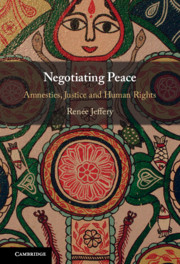2 - Amnesties and Human Rights in Asia
Published online by Cambridge University Press: 04 March 2021
Summary
Drawing on the fundamental principles of the interpretive approach, this chapter provides a set of theoretical explanations for Asian resistance to the United Nations’ anti-amnesty norm. Building on existing explanations for resistance to human rights accountability norms in Asia, it details the historical and contemporary contexts, beliefs and ideas that have led peacemakers to resist the UN’s anti-amnesty policy in the region. It argues that resistance in the Asia-Pacific can be attributed to the persistence of longstanding beliefs about the importance of preserving the sovereignty, stability, and sanctity of the state. These beliefs, which found prominent form during the ‘Asian values’ debate of the 1990s, were forged in a context in which state formation and consolidation existed in tension with relentless separatist claims and the persistent threat of state disintegration.
- Type
- Chapter
- Information
- Negotiating PeaceAmnesties, Justice and Human Rights, pp. 72 - 99Publisher: Cambridge University PressPrint publication year: 2021

